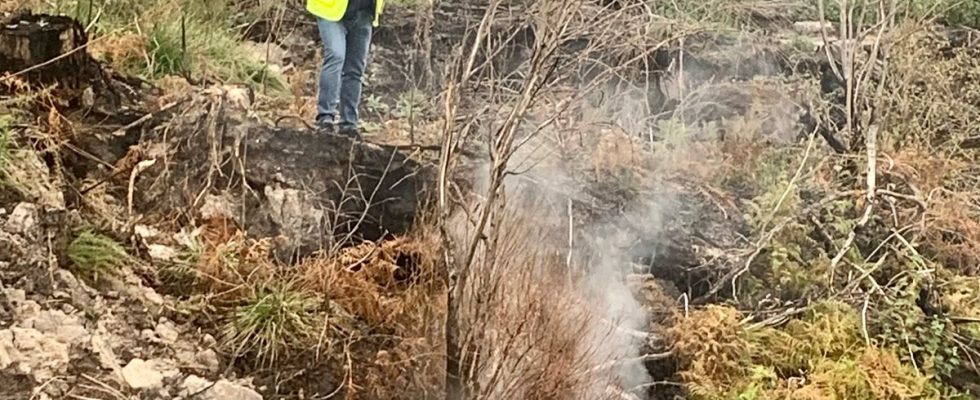Fumes still escaping from the ground at the end of November, and temperature readings still very high, despite the heavy rains that have fallen in recent weeks. Why is the fire still smoldering underground on the Hostens site, fifteen months after the gigantic Landiras fire which ravaged the south of Gironde, up to this departmental area, during the summer 2022?
“We are indeed seeing that, despite the heavy rains, many outbreaks remain active, with fire intensities equivalent to what we have been experiencing for a year and a half,” confirms 20 minutes Franck Uteau engineer at the environment department of the Gironde department. On Wednesday morning, we were able to measure up to 420°C on one of the sites, in contact with the outbreak. »
“A fire that feeds itself”
This natural area around Lake Hostens is based on a former lignite mine [type de charbon utilisé pour générer de l’électricité]which was used to power a power station in Hostens from 1932, and whose extraction stopped in 1960. “There remains lignite in the ground, and thanks to a system of underground galleries, calls of air generated by a root network which burns, we have a fire which feeds itself with the wind, and as long as there is nothing to stop it, it will continue to burn” Franck explained to us Uteau in February 2023, when we went there.

“It’s always the same sectors that are active,” explains Franck Uteau today. The past summer did not see any strengthening of the fire, but the very rainy autumn did not calm it down either, so we stick with what we observed from December 2022, when we We carried out the first measurements on the site. We are in a stable situation, where the fire remains underground, with a priori very little impact on the surface area. »
“The objective is to put an end to this smoldering lignite fire”
Even if it is not considered worrying, the situation still seems incredible, since nothing seems to be able to stop this fire. “I’m not that surprised,” tempers the engineer, “because we had already experienced rainy episodes during which we saw hot spots disappear then reappear as soon as the rains stopped. The fire does not go out because there is fuel underground which has its own dynamics and which seems impervious to any external intervention. Will it ever die out? This will depend on the quantity of fuel. This is what will be the subject of the work that we will carry out in 2024, to determine the state of the subsoil, and the link between the outbreaks observed on the surface. »
A scientific mission will in fact start at the beginning of 2024. “We will work with the BRGM [Bureau de recherches géologiques et minières], which will pass electric current through the ground, which will allow us to define the different layers and identify the lignite, to determine whether it is consumed or intact lignite, announces Pascale Got, vice-president of the department responsible for Environmental protection. Then we can do core drilling to cut the lignite lines that have not burned. The objective is to put an end to this smoldering lignite fire. »
“In the end, we will leave better armed than currently”
An end which could occur in several years, like the Centralia coal mine in Pennsylvania, where the fire has been active for sixty years. “I don’t think we are in the same situation, because we have lignite, not coal,” reassures Franck Uteau. But it’s hard to imagine not worrying about it all the same. »
If the safety of the site is at stake, the extinction of this underground fire is also essential to ensure its future, the departmental council wishing to create a sort of open-air laboratory in this area. “This will allow us to determine what we can replant, and where,” explains Pascale Got, convinced that in the end, we will leave better armed than currently. »

